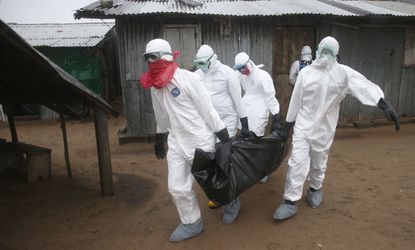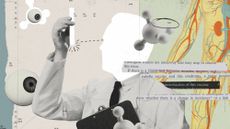Why people struggle to comprehend massive losses of life
Ebola has killed nearly 5,000 people this year. That's not an easy number to wrap your head around.


People find it difficult to understand the true value of loss of life when the numbers are large. For instance, a study found that people are more willing to donate money to an organization when just one of many identified victims' picture was shown, than when the same organization was presented as one helping millions of people.
This sort of biased decision-making is the result of the "affect heuristic." Heuristics are shortcuts that our brains use to work through day-to-day life. In this case, the heuristic is the result of subtle feelings or faint whispers of emotion.
These affective judgments suggest that people comprehend reality in two fundamentally different ways — an intuitive, automatic, and experiential one and an analytic, rational one. Most of the risk analysis and decisions come about quickly and intuitively by feelings arising from an experiential mode of thinking.
Subscribe to The Week
Escape your echo chamber. Get the facts behind the news, plus analysis from multiple perspectives.

Sign up for The Week's Free Newsletters
From our morning news briefing to a weekly Good News Newsletter, get the best of The Week delivered directly to your inbox.
From our morning news briefing to a weekly Good News Newsletter, get the best of The Week delivered directly to your inbox.
However, the domination of one form of thinking over the other can have detrimental results. One aspect of such worry has to do with the way we comprehend tragic and massive losses of life.
Response to genocide? Inaction
Psychological explanations suggests that a lack of an affective reaction will most often lead to equal inaction. That is why, in response to reports of genocide and widespread tragedies, we see large inaction. Rationally, every life should be equally valued and the value of saving X lives should be X times the value of saving one life.
Research, sadly, doesn't seem to corroborate this. People display diminishing sensitivity as the number of lives at risk increases. This is probably because the importance of saving one life is easy to imagine, visualize, and form an affective reaction to. However, larger losses are not so easily perceived with the experiential mode of thought, so we may not feel much difference in saving a 1,000 or 2,000 lives.
Sign up for Today's Best Articles in your inbox
A free daily email with the biggest news stories of the day – and the best features from TheWeek.com
This type of affective numbing has been shown in people's willingness to fund lifesaving interventions. For instance, in a study people were asked to indicate the number of lives a medical research agency would have to save to merit a $10 million grant. When the population at risk was 15,000, the answer, on average, was that 9,000 lives needed to be saved. Thus implicitly valuing each life at around $1,100 to warrant giving the money. However, when the population at risk was 290,000, the average response was to save 100,000 lives to warrant the grant — valuing each life at around $100. So, 9,000 lives in the smaller population were seen as more valuable than saving 10 times more lives in the larger population.
Ebola risks
These are not theoretical questions. As we speak, the death toll caused by Ebola is increasing and so is the risk. The World Health Organization has suggested it needs a whole lot of money to curtail the spread, and many people are deciding whether or not this cause is worth giving money to.
The natural and easy way of dealing with moral issues and ones involving catastrophic losses of life is to rely on our intuition and immediate affective reactions. These intuitions often fail us, and this is not a trifling failing.
Heuristics developed because they often prove to be useful. However, when a scenario shows its failing, what can be done to mitigate its destructive influence?
Helping makes you feel good
Several things could be suggested. Consider nudges in the right direction. We know for instance that helping and donating feels good. Making it a default to donate a slight amount when paying one's phone bill coupled with feedback on who in particular has been helped by this donation can lead to positive affect being linked to giving and propagated further.
Another point is developing techniques and working on assigning meaning to large numbers. For instance, large-scale losses of life could be extracted from their frames as simple statistics. Instead of saying hundreds were killed in the last few days, we could make the loss more salient. Perhaps by indicating that the number of people lost in this conflict so far equals an entire neighborhood of one's city and so on.
Compassion, after all, is the basis of all morality. Giving and helping are hampered so much by the way we construe and act upon risk.
More from The Conversation...
- This is why some urban legends go viral
- How to save time: a rule-of-thumb to choose what health stories to ignore
- The challenge of sorting fact from fiction on coal seam gas
-
 Will California's EV mandate survive Trump, SCOTUS challenge?
Will California's EV mandate survive Trump, SCOTUS challenge?Today's Big Question The Golden State's climate goal faces big obstacles
By Joel Mathis, The Week US Published
-
 'Underneath the noise, however, there’s an existential crisis'
'Underneath the noise, however, there’s an existential crisis'Instant Opinion Opinion, comment and editorials of the day
By Justin Klawans, The Week US Published
-
 2024: the year of distrust in science
2024: the year of distrust in scienceIn the Spotlight Science and politics do not seem to mix
By Devika Rao, The Week US Published
-
 'Once the best in the Middle East,' Beirut hospital pleads for fuel as it faces shutdown
'Once the best in the Middle East,' Beirut hospital pleads for fuel as it faces shutdownSpeed Read
By Tim O'Donnell Published
-
 Israeli airstrikes kill senior Hamas figures
Israeli airstrikes kill senior Hamas figuresSpeed Read
By Catherine Garcia Last updated
-
 An anti-vax conspiracy theory is apparently making anti-maskers consider masking up, social distancing
An anti-vax conspiracy theory is apparently making anti-maskers consider masking up, social distancingSpeed Read
By Peter Weber Last updated
-
 Fighting between Israel and Hamas intensifies, with dozens dead
Fighting between Israel and Hamas intensifies, with dozens deadSpeed Read
By Catherine Garcia Last updated
-
 United States shares 'serious concerns' with Israel over planned evictions
United States shares 'serious concerns' with Israel over planned evictionsSpeed Read
By Catherine Garcia Published
-
 Police raid in Rio de Janeiro favela leaves at least 25 dead
Police raid in Rio de Janeiro favela leaves at least 25 deadSpeed Read
By Catherine Garcia Published
-
 Derek Chauvin's attorney files motion for new trial
Derek Chauvin's attorney files motion for new trialSpeed Read
By Catherine Garcia Last updated
-
 At least 20 dead after Mexico City commuter train splits in overpass collapse
At least 20 dead after Mexico City commuter train splits in overpass collapseSpeed Read
By Peter Weber Published